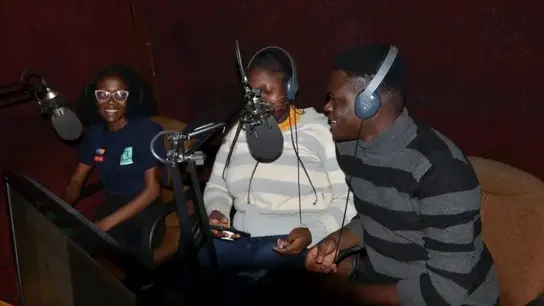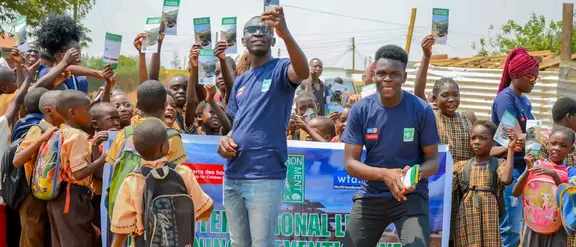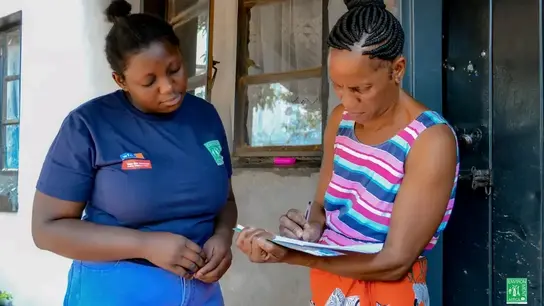Zambia: Young people campaign against lead mining
Kabwe is considered one of the most toxic places in the world – the reason: a century of lead mining. Many of its 200,000 inhabitants have high levels of lead in their blood, which can lead to memory loss, infertility, and developmental delays, among other things. In this interview, Natalie (18) and Caleb (22) talk about life in a poisoned city, the excuses politicians make, and their hopes for future generations.
Lead is found in the soil of Kabwe, in the water, and in the blood of its inhabitants, even though the mine was closed in 1994. What has been done since then to combat the poisoning of the city?
Natalie: There are many people who comment on the topic, but little happens.
Caleb: When you know the people who could do something but do nothing, it's incredibly painful. We come up with strategic measures – the politicians respond with excuses. Natalie participated in a roundtable discussion. There, they said Kabwe should become a green city. The cleanup work to remove the contaminated soil was supposed to start no later than July 2023. To this day, nothing has happened. If the politicians continue to just hold meetings and don't even begin to address the problem, we'll become a museum of meetings. Meanwhile, here in Kabwe, we're sitting on a ticking time bomb. How long is this supposed to go on?
Natalie: When children have high lead levels in their blood, they receive medication. Some of them are then not allowed to go to school because many schoolyards are also contaminated. As a result, they miss out on important learning material. And after the treatment, they are exposed to the toxin again anyway.
Caleb: My levels were also found to be too high. I was seven. I was able to go to school, but after school I wasn't allowed to play in the street with my friends for a year. Then my levels improved and we moved to a less contaminated neighborhood.

Nevertheless, lead mining continues.
Caleb: There's too little work in Kabwe. That's why mainly young people, but also mothers, mine lead. They also extract zinc, cobalt, and dolomite. Dolomite is used for construction. The stones are contaminated and bring new lead into the residential areas. The miners themselves work without protection. They, too, carry the toxic dust into town on their clothes. We try to talk to them about the poison and find out what they think about other job opportunities. But many are hostile towards us. During one of our visits, they threatened to throw stones at us. They're afraid that the mines will be closed and they'll lose their income.
In October 2020, lawyers on behalf of over 100,000 children and women filed a lawsuit against Anglo American South Africa. For many years, the corporation operated the world's largest lead mine in Kabwe. Among other things, the group is demanding the remediation of the contaminated areas. The legal proceedings are still ongoing. Nevertheless, the question remains: What does this mean for Kabwe?
Natalie: It offers a chance for justice for so many affected children, mothers, and parents. How much the people of Kabwe have suffered in silence. And now this legal process brings their voices to the public eye.
As members of Environment Africa, you raise awareness about the dangers of lead. How do you do that?
Natalie: Many people aren't aware of the danger. That's why we distribute flyers and provide information on how to protect oneself from toxic lead dust. We organize workshops and visit schools. Lead poisoning is a huge environmental problem, but not the only one: Deforestation and a lack of waste disposal systems also severely impact our environment. Garbage is lying around everywhere and clogging sewers. This exacerbates flooding during heavy rainfall, which is occurring more and more frequently as a result of climate change – as are droughts.
What is your wish for future generations?
Natalie: Through the Kabwe Youth Network, I saw what we can achieve together. I would be delighted if even more young people became part of this change. I expect our politicians to involve children and young people in decision-making processes. Young people have so many ideas, so many skills, but they rarely get the chance to contribute.
Caleb: My hope for future generations is that they can live in an environment that doesn't threaten human life. I don't want future generations to have to deal with these devastating effects of lead. I'd also like to see more young people giving back to the environment and acknowledging the fact that we only have one Earth. If we don't treat it with respect, we will become extinct.

